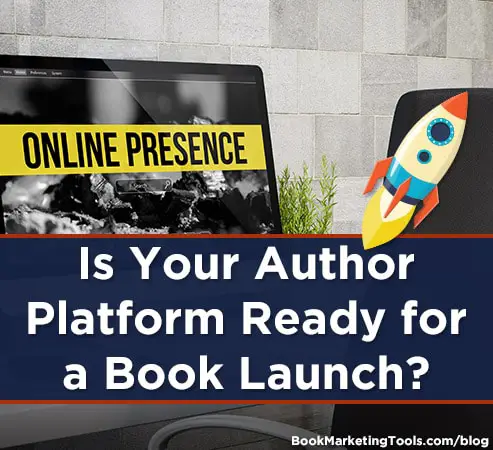A successful book launch starts with laying the groundwork for a solid online presence and fan base months before publication. Without either of those things, you’ll have a tough time selling your new book. Although you don’t need a massive platform, you should create plenty of opportunities for readers to find you and get to know you and your work.
What Is An Author Platform?
When we talk about an author platform, we’re referring to both owned and rented assets. Owned assets include any digital real estate that’s under your control (i.e. your author website, blog, email list, author newsletters, etc.). Rented assets include any digital real estate that isn’t under your control (i.e. social media accounts, book product pages, author profiles on sites like Amazon Central, Goodreads, Bookbub, etc.).
Can you launch without some of these resources? Sure, but your launch may not be as impactful as it could be. In addition, you’re unlikely to generate long-term results.
If you’re ready to go to market and you haven’t built a platform or nurtured relationships with readers, don’t panic. There are quick and easy hacks like creating a book landing page, writing a press release, publishing articles in relevant online and offline publications, participating in events, and paying for advertising that can help you spread the word about your book.
If, on the other hand, you’ve been creating an online presence, generating exposure for your brand and book, and connecting with target readers and influencers, you’ll want to evaluate your digital assets at least a month before launch.
Assess Your Author Platform
Here’s a quick list of questions to help you through the assessment process:
- Is your branding on point? This includes your domain name, author name, logo, tagline, typography, voice, tone, colors, visuals, USP, author story, and anything else that differentiates you from the competition. Be sure to check all assets—both owned and rented—for consistency.
- Have you created a dedicated sales page? If you’re selling through your website, then you’ll want to make sure this is set up and working properly.
- Have you added banner ads to assets like your blog and website? Prominently placed ads can help draw attention to your new book.
- Are you employing proven search engine optimization tactics across all platforms? When researching your target market, you should have made a list of keywords your audience uses to search for books like yours. Now’s the time to use it.
- Have you used keyword-rich and catchy copy in your author bio, book description, and other critical content?
- Are you using professional and eye-catching profile pictures across your platforms?
- Have you added editorial reviews where applicable?
- Have you added website and blog links to your social media accounts, as well as integrated social media buttons into your website?
- Have you added upcoming events to relevant sections on your website, author profiles, and book pages?
- Have you uploaded a book trailer to your assets?
- Have you claimed other books you’ve authored or co-authored on your Amazon Central page and other profiles?
As a word of caution, don’t rely on retailers to be your overall marketing strategy. Publishing on Amazon and Barnes & Noble does not make a successful book launch—they can change the game at any time, removing your product page and reviews or changing the rules in a way that results in fewer sales. Therefore, you need to be smart about your platform and take control of what you can as early as possible in the process.
What are you doing to secure both owned and rented book launch assets? How are you preparing those platforms and building your audience? Share your tips with us in the comment section below. Don’t forget to subscribe to our blog and download our free book launch checklist to ensure you’re up to date on the latest book launch marketing techniques.


